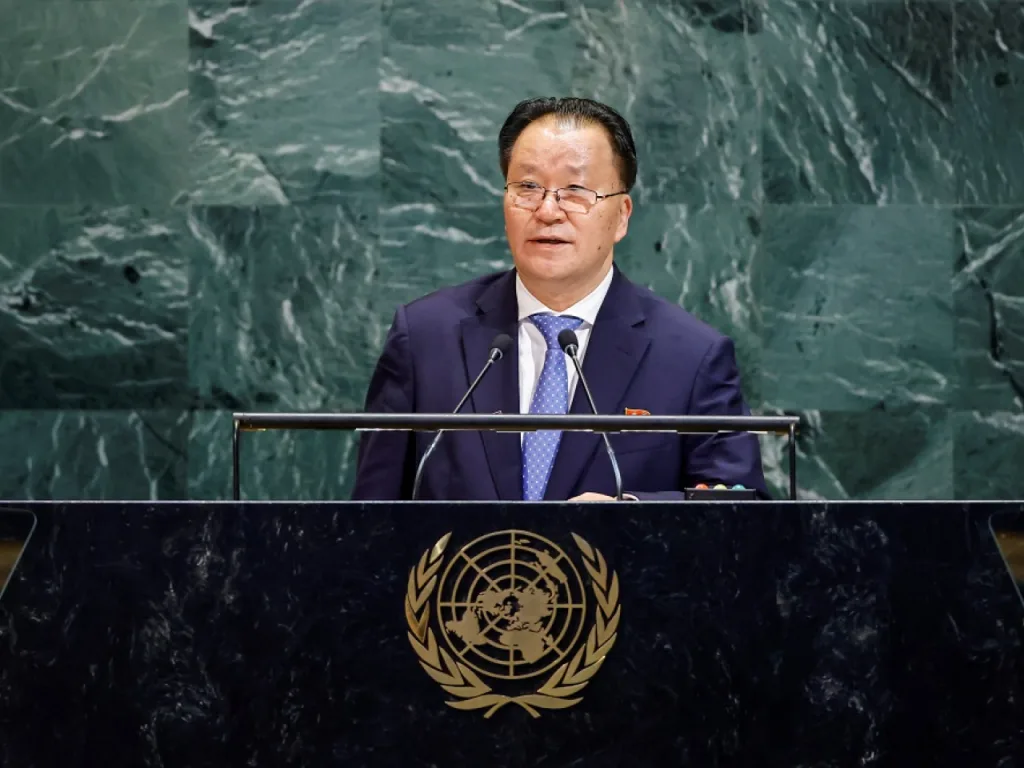New York, USA – September 30, 2025
North Korean Minister Tells UN:we won’t surrender!
Pyongyang Vows Permanent Nuclear Status at UN General Assembly, Conditioning Talks on Dropping Denuclearisation Demand
In a rare and defiant appearance at the United Nations General Assembly, North Korea’s Vice Minister for Foreign Affairs, Kim Son Gyong, delivered an uncompromising message to the world body:
Pyongyang will never surrender its nuclear weapons program. Addressing the high-level gathering for the first time since 2018, the senior diplomat framed the country’s nuclear arsenal as a “sacred and absolute” guarantor of sovereignty, but simultaneously suggested a willingness to engage in diplomacy if the United States drops its long-standing precondition for talks.
Kim’s passionate speech asserted that the imposition of denuclearisation on the Democratic People’s Republic of Korea (DPRK) is “tantamount to demanding it to surrender sovereignty and right to existence.”
He stated, “We will never give up nuclear which is our state law, national policy and sovereign power as well as the right to existence.
Under any circumstances, we will never walk away from this position.” This exciting re-affirmation of North Korea’s nuclear status sets a firm new baseline for any future negotiations with Washington or its allies.

Headline Points of the Minister’s Address
* Nuclear Weapons are Permanent:
Pyongyang declared its nuclear status as irreversible, noting the program is enshrined in the DPRK’s constitution as a matter of state law.
* Balance of Power:
The Vice Minister argued that North Korea’s nuclear arsenal is a necessary “physical war deterrent” that ensures a “balance of power” on the Korean Peninsula against the “growing threat of aggression” from the US and its allies.
* Criticism of Military Drills:
Kim heavily criticised the increasing scale and frequency of trilateral military exercises between the US, South Korea, and Japan, characterising them as “serious challenges” to regional security.
* Door Open to Dialogue:
Despite the staunch rhetoric, the statement, following comments last week by North Korean leader Kim Jong Un, indicated an openness to resume talks with the US, provided Washington ceases to demand denuclearisation as a precondition.
* International Alignment:
The Vice Minister stated that the DPRK will “collaborate with all countries and nations that oppose and reject aggression, intervention, domination and subjugation.”
A New Diplomatic Calculus
The speech underscores a hardening of North Korea’s official position, moving its nuclear program from a bargaining chip to a non-negotiable aspect of national identity and security. This is particularly significant given US President Donald Trump’s repeated expressions of hope for restarting the direct, personal diplomacy he conducted during his previous term in office.
The North Korean leader’s recent offer to talk if the US stops insisting on nuclear disarmament, now echoed at the UN, presents a clear challenge to Washington and Seoul. It suggests that any future diplomatic engagement must focus on alternative objectives, such as freezing nuclear and missile production, moderating the use and deployment of the existing arsenal, or providing security guarantees, rather than the ultimate goal of complete, verifiable, and irreversible denuclearisation (CVID).
International Reactions and Outlook
The international community, which has enforced increasingly stringent UN Security Council sanctions on North Korea since 2006, is left grappling with the implications of the “never surrender” stance.
While the US and its regional allies are expected to maintain their formal demand for CVID, the practical reality is that North Korea continues to advance its weapons program.
Russia and China, both permanent members of the UN Security Council, have recently advocated for the easing of sanctions on humanitarian grounds and to incentivize Pyongyang back to the negotiating table.
The North Korean minister’s remarks appear to be an attempt to use this division and the global stage to solidify its status as a de facto nuclear power while simultaneously attempting to shift the burden of restarting negotiations onto the United States.
